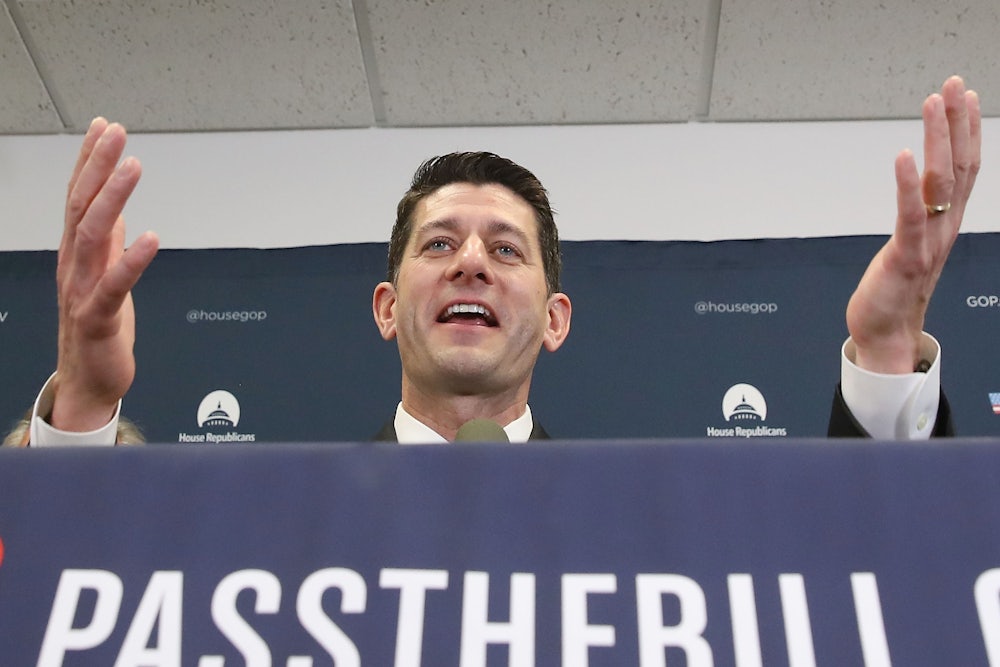The basic dilemma that has prevented House Republicans from passing the American Health Care Act is that their majority, while large, isn’t large enough to span the divide between those on the right who would like to repeal the Affordable Care Act altogether, and vulnerable or moderate members who fear or oppose eliminating Obamacare’s central benefits.
Chief among those benefits is the ban on discrimination against people with pre-existing conditions. An ACA alternative that preserves these protections will hemorrhage conservative support; one that eliminates them will hemorrhage the support of others. GOP leaders, including President Donald Trump and House Speaker Paul Ryan, are attempting to resolve this dilemma by caving to the right’s substantive demands and lying to everyone else.
VERIFIED: MacArthur Amendment strengthens AHCA, protects people with pre-existing conditions. https://t.co/6W7bDEO40r
— Paul Ryan (@SpeakerRyan) May 2, 2017
The MacArthur amendment is a series of provisions that persuaded nearly all House conservatives to support the AHCA. Among other things, it would allow states to waive Obamacare’s blanket prohibitions against charging sick people more for health insurance and selling plans that don’t cover basic medical services like doctor visits and hospitalization.
On the face of it, these changes would leave people with pre-existing conditions more vulnerable to uninsurance, medical bankruptcy, and death than they are under current law. The provisions of the MacArthur amendment, and the backlash to it, explain why Republican leaders are finding it difficult to cobble together 216 votes for the AHCA, even after winning over most members of the conservative House Freedom Caucus. Many House Republicans have vowed to save pre-existing conditions protections and would violate their promises by voting for the amended AHCA.
The purpose of claiming that the amendment “protects people with pre-existing conditions” is to allay those concerns. Ryan is cashing in whatever trust his wavering House members and the skeptical public have placed in him by telling them something that is not so. Should the AHCA fail in the House or go nowhere in the Senate, Ryan can perhaps reclaim that trust. But the AHCA can’t become law unless it first passes the House, and the conspicuously peculiar tactics Ryan is using to complete that step should make these members wonder whether their trust isn’t warranted to begin with.
Ryan’s assertion that the AHCA’s imagined protections for the ill have been “VERIFIED” is a testament to how deeply Trump’s unique contempt for truth has seeped into Republican discourse. Rank and file Republicans may trust Ryan more than they trust his critics, but they should consider, briefly, why Ryan would make such a claim based on no external citations. It isn’t that Ryan’s relying on biased third-parties for verification—he is relying on none at all.
If Ryan is being truthful when he claims the new AHCA amendments protect those with pre-existing conditions, wavering House Republicans should ask themselves why their colleague, Mo Brooks of Alabama, is celebrating the amendments for “requir[ing] people who have higher health care costs to contribute more to the insurance pool that helps offset all these costs, thereby reducing the cost to those people who lead good lives.”
Or why their other colleague, Robert Pittenger of North Carolina, believes the amendment might result in people with pre-existing conditions picking up and moving to other states if they can’t afford insurance in their own.
Or why Ileana Ros-Lehtinen, who is retiring, would say this.
Ileana Ros-Lehtinen calls AHCA's coverage for pre-existing conditions coverage "in name only."
— Matt Fuller (@MEPFuller) May 2, 2017
Of course there are almost 240 Republican members of the House, and it stands to reason that a few of them might be mistaken about the consequences of this bill. But it is an odd coincidence that their descriptions line up neatly with the analyses of health care experts, and the concerns of patients and providers, who warn that the amended AHCA would badly erode pre-existing conditions protections relative to current law.
It is odder still that Ryan and Trump are trying to hasten a vote in order to end-run the Congressional Budget Office, rather than hold off for a few days to allow CBO to vindicate the legislation by dispelling all these supposed misconceptions.
Earlier this week I argued that GOP supporters of the AHCA should imagine the Trump administration implementing it as law, in all of its complexity, and ask themselves if they want to be held to account if and when he executes it incompetently. Those supporters, along with those who are on the fence, should ask themselves another, different question: Will the bill actually do what Paul Ryan says it will do, and what will the human and political consequences be if it turns out their faith in him is misplaced?
